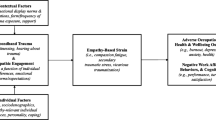Abstract
Purpose
There is growing evidence in psycho-oncology that people can experience posttraumatic growth (PTG), or positive life change, in addition to the distress that may occur after a cancer diagnosis. Many studies utilise existing PTG measures that were designed for general trauma experiences, such as the Posttraumatic Growth Inventory. However, such inventories may not take into account life changes associated with a crisis specifically in a health-related context.
Method
The current study presents a mixed method exploration of the post-diagnosis experience of cancer survivors (N = 209) approximately 3 years after diagnosis.
Results
Quantitative and qualitative assessment of PTG showed that appreciating life was the most salient area of positive life change for cancer survivors. The results also revealed that in addition to several PTG domains captured by existing quantitative PTG measures, further positive life changes were reported, including compassion for others and health-related life changes.
Conclusions
These domains of PTG highlight the unique context of a cancer diagnosis and the potential underestimation of positive life change by existing inventories. Further research is warranted that is directed towards designing a context-specific PTG measure for cancer survivors.
Similar content being viewed by others
References
Brennan J (2001) Adjustment to cancer—coping or personal transition? Psycho-Oncology 10:1–18. doi:10.1002/1099-1611(200101/02)10:1<1::AID-PON484>3.0.CO;2-T
Ho SMY, Chan CLW, Ho RTH (2004) Posttraumatic growth in Chinese cancer survivors. Psycho-Oncol 13:377–389. doi:10.1002/pon.758
Cordova MJ, Giese-Davis J, Golant M, Kronenwetter C, Chang V, Spiegel D (2007) Breast cancer as trauma: posttraumatic stress and posttraumatic growth. J Clin Psychol Med Settings 14:308–319. doi:10.1007/s10880-007-9083-6
Kangas M, Henry J, Bryant R (2002) Posttraumatic stress disorder following cancer: a conceptual and empirical review. Clin Psychol Rev 22:499–524. doi:10.1016/S0272-7358(01)00118-0
Tedeschi R, Calhoun L (2006) Posttraumatic growth in clinical practice. In: Calhoun L, Tedeschi RG (eds) Handbook of posttraumatic growth: research and practice. Lawrence Erlbaum, Mahwah, pp 291–310
Lin C-C, Tsay H-F (2005) Relationships among perceived diagnostic disclosure, health locus of control, and levels of hope in Taiwanese cancer patients. Psycho-Oncology 14:376–385. doi:10.1002/pon.854
Stanton AL, Bower JE, Low CA (2006) Posttraumatic growth after cancer. In: Calhoun LG, Tedeschi RG (eds) Handbook of posttraumatic growth: research and practice. Lawrence Erlbaum, New Jersey, pp 138–175
Tedeschi RG, Calhoun LG (1996) The Posttraumatic Growth Inventory: measuring the positive legacy of trauma. J Trauma Stress 9:455–471. doi:10.1002/jts.2490090305
Linley P, Andrews L, Joseph S (2007) Confirmatory factor analysis of the Posttraumatic Growth Inventory. J Loss Trauma 12:321–332. doi:10.1080/15325020601162823
Morris BA, Shakespeare-Finch J, Rieck M, Newbery J (2005) Multidimensional nature of posttraumatic growth in an Australian population. J Trauma Stress 18:575–585. doi:10.1002/jts.20067
Tomich PL, Helgeson VS (2004) Is finding something good in the bad always good? Benefit finding among women with breast cancer. Health Psychol 23:16–23. doi:10.1037/0278-6133.23.1.16
Hefferon K, Grealy M, Mutrie N (2009) Post-traumatic growth and life threatening physical illness: a systematic review of the qualitative literature. Br J Health Psychol 14:343–378. doi:10.1348/135910708X332936
Pakenham KI (2007) The nature of benefit finding in multiple sclerosis (MS). Psychol Health Med 12:190–196. doi:10.1080/13548500500465878
Calhoun L, Tedeschi R (2006) The foundations of posttraumatic growth: an expanded framework. In: Calhoun L, Tedeschi RG (eds) Handbook of posttraumatic growth: research and practice. Lawrence Erlbaum, New Jersey, pp 3–23
Morris BA, Shakespeare-Finch J (2010) Rumination, posttraumatic growth, and distress: Structural equation modelling with cancer survivors. Psycho-Oncol. doi:10.1002/pon.1827
Sears S, Stanton A, Danoff-Burg S (2003) The yellow brick road and the emerald city: benefit finding, positive reappraisal coping, and posttraumatic growth in women with early-stage breast cancer. Health Psychol 22:487–497. doi:10.1037/0278-6133.22.5.487
Riessman CK (2008) Narrative methods for the human sciences. Sage, Los Angeles
Thomas RM (2003) Blending qualitative and quantitative research methods in theses and dissertations. Corwin Press, Thousand Oaks
Bazeley P (2007) Qualitative data analysis with NVivo. Sage, Los Angeles
Lincoln YS, Guba EG (1985) Naturalistic inquiry. Sage, Los Angeles
Lechner SC, Zakowski SG, Antoni MH, Greenhawt M, Block K, Block P (2003) Do sociodemographic and disease-related variables influence benefit-finding in cancer patients? Psycho-Oncology 12:491–499. doi:10.1002/pon.671
Shakespeare-Finch JE, Copping A (2006) A grounded theory approach to understanding cultural differences in posttraumatic growth. J Loss Trauma 11:355–371. doi:10.1080/15325020600671949
Shakespeare-Finch J, Morris BA (2010) Posttraumatic growth in Australian populations. In: Weiss T et al (eds) Posttraumatic growth and culturally competent practice: lessons learned from around the globe. Wiley, New York
Carboon I, Anderson VA, Pollard A, Szer J, Seymour JF (2005) Posttraumatic growth following a cancer diagnosis: do world assumptions contribute? Traumatology 11:269–283. doi:10.1177/153476560501100406
Copping A, Shakespeare-Finch J, Paton D (2008) Modelling the experience of trauma in a white-Australian sample. Proceedings of the Australian Psychological Society 43rd Annual Conference, Hobart, Australia
Sica G (2006) Bias in research studies. Radiology 238:780–789
Australian Institute of Health and Welfare (2007) Cancer in Australia: an overview 2006 (Cancer Series No. 37). AIHW, Canberra, Australia
Connor M, Norman P (1996) The role of social cognition in health behaviours. In: Connor M, Norman P (eds) Predicting health behaviour. Open University Press, Buckingham, pp 1–22
Acknowledgements
The authors are appreciative to the WP Holman Clinic at the Launceston General Hospital, Tasmania for their assistance in this project. We especially thank Dr Kim Rooney and Ms Loris Towers. We also express gratitude to the participants for their overwhelming and supportive response.
Conflicts of interest
There is no conflict of interest between the authors and any funding bodies that would have a direct bearing on this article. The corresponding author has full control of all data relating to this article and would allow the journal to review this data if requested.
Author information
Authors and Affiliations
Corresponding author
Rights and permissions
About this article
Cite this article
Morris, B.A., Shakespeare-Finch, J. & Scott, J.L. Posttraumatic growth after cancer: the importance of health-related benefits and newfound compassion for others. Support Care Cancer 20, 749–756 (2012). https://doi.org/10.1007/s00520-011-1143-7
Received:
Accepted:
Published:
Issue Date:
DOI: https://doi.org/10.1007/s00520-011-1143-7




